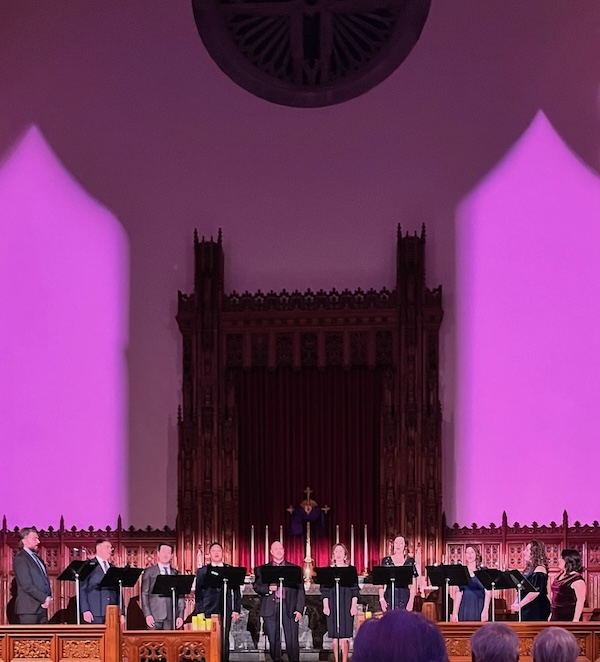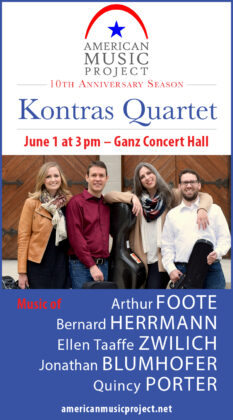Chicago a cappella branches out impressively with a program of English choral music

It’s been a good season for English choral music. Bella Voce presented a choice concert of William Byrd’s music last fall that included his majestic Mass for Five Voices.
On a chilly Saturday night in River Forest, Chicago a cappella showed that they are about more than Beatles songs and cabaret tunes with “Cambridge Concert.” This generous program of works from the English choral tradition roved gracefully from Byrd and Morley to Vaughan Williams and Britten with a bonus local premiere. There are three more performances through February 25.
The program, performed at Grace Lutheran Church, was a personal one for CAC artistic director John William Trotter, who spent two impactful terms from 2019-20 at the University at Cambridge as a visiting fellow.
Chicago a capella’s ten singers provided brief, engaging introductions to the works Saturday as did Trotter for the evening’s premiere. Too bad a malfunctioning microphone made most of the spoken remarks virtually inaudible.
The first half of the program concentrated on sacred selections with a subdominant theme of waking and sleeping as a spiritual metaphor.
William Byrd was represented with three works. His Haec Dies opened the evening and made an apt calling card for the versatile singers. Their polished, finely balanced vocalism was impressive all evening, and the exuberant performance of Haec Dies conveyed the joyous aspect of Byrd’s leaping lines. The ensemble brought apt monastic expression to a spacious performance of Byrd’s Ave Verum Corpus and lively vigor to his Vigilate.
The Ave Maria of the mysterious Tudor-era Robert Parsons is a strikingly beautiful setting, and the singers gave the weaving polyphony rapt and glowing advocacy.
The stratospheric writing of Charles Villiers Stanford’s Beati quorum via held no terrors for the CAC sopranos who soared in the high tessitura. William Harris’s Faire is the Heaven (heard in John Rutter’s arrangement) was equally well done, the devotional aspect of the Old English text put across in the lively contrapuntal writing.
Now in its third year, Chicago a cappella’s HerVoice competition was created by Trotter to provide mentorship and performance opportunities for women composers of unaccompanied choral music.
Grace Brigham, one of this year’s four HerVoice winners, was represented with her Sundowning, heard Saturday night. The title refers to the anxiety and agitation that often afflicts dementia patients in the late afternoon hours (hence the term, “sundowning”). The music was inspired by Brigham’s experience working as a CNA in a dementia unit in college and, later, caring for her grandfather.
With a sensitive text by Shae Lime, Sundowning gently conveys the distress and confusion of the patient in graceful, overlapping vocal lines, moving from disquiet to acceptance and stoic peace in its brief duration. It is no small praise to say that Brigham’s affecting work did not pale next to the music of the masters surrounding it.
The shorter second half moved to the secular side of things and more lighthearted music.
The singers nicely conveyed the madrigal style of Thomas Morley’s Arise, Awake with its gamboling nymphs and shepherds; the coming of spring was surely to be wished for on a frigid night.
Orlando Gibbons’ concise The Silver Swan was given focused expression. And composer and serial uxoricide Henry VIII was represented with his Pastime with good company, a buoyant ode to manly pleasures, heard in Geoffrey Shaw’s arrangement.
The concert concluded with the country matters of folksong. The singers brought great relish to Ralph Vaughan Williams’ English Folk Songs, with yearning expression in “The Turtle Dove,” and romantic melancholy in “The Lover’s Ghost.”
In Benjamin Britten’s more studied and ironical folk-song arrangements, the Chicago a cappella members gave ardent advocacy to three selections from his Five Flower Songs. The singers plumbed the rapt expression of “The Evening Primrose” as surely as the rustic humor of “Ballad of Green Broom.”
A warm-toned, consolatory rendering of Rani Arbo’s “Crossing the Bar”—a peaceful leave-taking of earthly life—concluded a fine showing for the versatile artists of Chicago a cappella.
Chicago a cappella repeats the program 4 p.m. Sunday at St. Luke’s Episcopal Church in Evanston; 7:30 p.m. February 24 at St. Michael Catholic Church in Wheaton; and 3 p.m. February 25 at St. Josaphat Church. chicagoacappella.org
Posted in Performances




